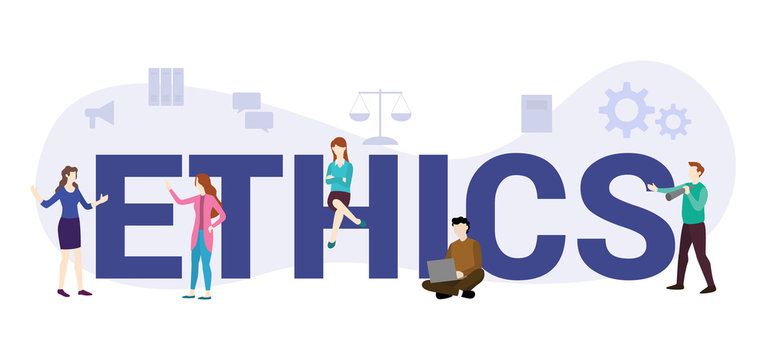
There are many approaches to ethics. I will briefly outline two types of theoretical approach to ethics and their implications: principle-based approaches, and character and relationship-based approaches.
Principle-based approaches to ethics
It is important to understand this concept. This approach has often been based on two different ethical traditions – Kantianism and utilitarianism. Immanual Kant, was a German philosopher (1724-1804) in the eighteenth-century. He developed a theory of ethics.
This approach to ethics is known as ‘deontological’ or duty-based. It plays a vital role in moral philosophy and also in professional ethics. ‘Persons’ are considered to have rational and self-determination – it means they are capable of making choices and acting upon them. For deontological ethics, the important thing isn’t the result or consequence of the action, but the action itself. If the action is wrong, in and of itself, then don’t do it.
This approach mainly has its focus on respect of the service user and also that he can make his own decisions. The main principles in this approach are to maintain confidentiality, obtain informed consent, no discrimination or offering misleading or false information. For Kant, it would be morally wrong to perform any action which is based on false information even though the end result is beneficial. According to this approach, we must all respect individual’s choices.
Utilitarianism, on the contrary, is a teleological theory. It is particularly associated with two British philosophers, Jeremy Bentham (1748-1832) and John Stuart Mill (1806-1873) (Mill 1863/1972). Also known as the consequentialist theory of ethics. The main difference lies in the concept and it is in striking contrast as compared to the Kantian ethics. The moral worth (rightness or wrongness) of an action is said to lie in its consequences; hence if we have to decide if an action is right or wrong, we have to weigh pros and cons and also anticipate. According to this concept, if lying leads to good results, it would probably be good to lie. This theory relies on the fact that whether something is right or wrong depends on the result or end of that action. Theories that are interested in ends are called teleological. The name has originated from the Greek word for ‘end’ – telos. For a teleological ethical thinker, the end justifies the means. The believers of this theory argue that the rightness of an action is judged by the end it produces.
In my opinion, people consider both types of ethical principles in making decisions. We have to make a judgment that ensures that we are looking at individual’s best interest or the welfare of the society at a bigger scale.
Absolute and Relative Ethics
Absolute ethics holds that there is one universal moral code which is final and applies equally to all men of all ages, and that changing situations or changing views make no difference whatsoever to this absolute moral code. Relative or relativistic ethics holds that the moral standard varies with different circumstances. There are so many cultural and religious differences and in some circumsatnces, it may be ethically correct to do certain things but in other situations it might be completely immoral. For example it is right for Muslim people to have four wives but for a Christian man this would be considered immoral.
Examples of ethical issues which can affect the operational activities of a business.
The advantages of ethical behaviour include:
Higher revenues – demand from positive consumer support. This will also lead to improved brand and business awareness and recognition. If the business in running in an ethical manner, it would also lead to better employee motivation and recruitment. And finally the business will grow because of new sources of finance.
The disadvantages of ethical behaviour include:
But sometimes the situation is difficult and there are some ethical issues faced. It can be difficult to decide as to what is right and what is wrong.
Certain examples are:
Use of child labour and forced labour: It is against the law to use children for work or to employ someone to work for you against his or her will. They might need the money but it is unethical. Even if the child or his parents agree and provide their consent, it is unethical and illegal to use child labour and do forced labour.
Production in sweatshops is also unethical. Sweatshop is a factory or production place where the working environment considered to be unacceptably difficult or dangerous.
Employee Working Conditions: employers must be aware of the safety of their work environment and must make sure that they pay their employees adequately. An employee should take ethics into consideration while giving a very difficult task or asking an employee to stay for long hours outside the working times.
Violation of the basic rights of workers: All workers have the basic rights. Everyone is entitled to a break when they have worked continuously for long hours. Even if there is a deadline to meet or there is lot of work to be completed, we must ensure that the basic rights are provided to all the workers.
Ignoring health, safety and environmental standards: Sometimes due to financial restraints the employer is not able to cater for the health and safety and it doesn’t meet the required standards. There is no excuse for this type of behaviour. This would be considered unethical.
Employee behavior: This can be a matter of debate. Should an employer allow his employees to read their personal emails at work? If the employee makes any complaint of harassment at work, how will the manager deal with it? These are few examples of ethical issues regarding employee behavior.
Supplier/Customer Relations: must consider whether it is ethical to do business with other business workers who have unethical practices.
References:
Ethical Studies Second Edition, Bob Bowie, Robert Bowie, Edition 2, illustrated, Publisher Nelson Thornes, 2004
Ethical Issues in Youth Work, Professional ethics, Sarah Banks, Taylor & Francis, 2010
Ethical Issues in Business: Inquiries, Cases, and Readings, Peg Tittle, Broadview Press, 2000
Current Issues in Business Ethics, Peter W. F. Davies, Routledge, 1997











